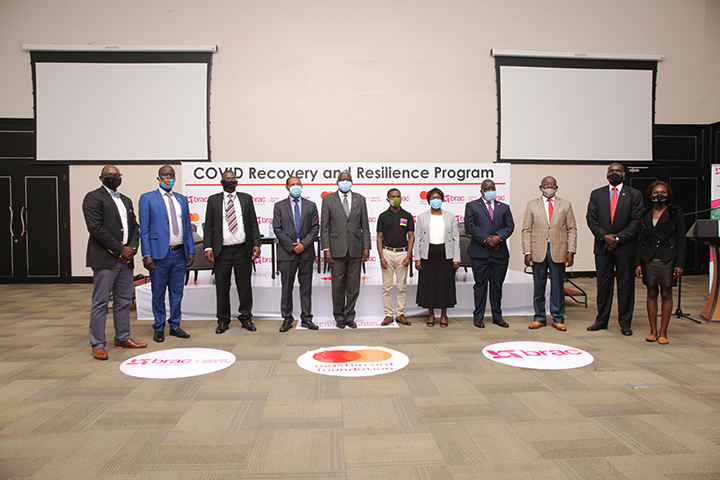COVID-19: MSMEs to access affordable credit to aid recovery
This follows the launch of the COVID-19 recovery and resilience programme by Brac Bank and Brac Uganda, a non-governmental Organisation, with support from Mastercard Foundation.
BUSINESS COVID-19 HEALTH
Micro, small and medium enterprises (MSMEs) that were greatly affected by the COVID-19 pandemic are set to access affordable credit that will help them bounce back into businesses.
This follows the launch of the COVID-19 recovery and resilience programme by Brac Bank and Brac Uganda, a non-governmental Organisation, with support from Mastercard Foundation.
The program seeks to enable COVID-19 prevention activities, support recovery of micro and small businesses that were greatly affected by the pandemic.
Speaking during the launch in Kampala on Wednesday, the Brac Uganda Bank managing director Jimmy Onesmus Adiga said the project is intended to enhance economic access and recovery of 5,400 women group borrowers, with access to microloans at a low-interest rate.
The loans are intended to enable them to slowly recover from the impact of the pandemic on their businesses.
Adiga added that part of the funds will be directed to build the capacity of Brac's 2,891 community health workers and ensure their safety as they work to reduce COVID-19 infection rates and also support 2,139 MasterCard Secondary School Scholars in preparing for the national exams.
The Brac NGO country director George Matete said the project will be implemented using a multi-pronged approach that ensures safety, security and safeguards, builds partnerships, raises awareness in communities about COVID-19 safety precautions and contributes to the social and economic resilience of their livelihood.

He noted that the interventions are uniquely tailored to suit each targeted beneficiaries due to their diversity in terms of financial exclusion and physical attributes, so as to help them realise their potential and sustainably transform their lives out of poverty.
The Head Business Development and Strategy, Brac Uganda Bank, William Alemi said that of the 5,400 businesses to be refinanced, about 1,134 are youth-led.
"We recognise that all the people across the country were hit by the pandemic and most of our clients' businesses did not survive this. So Mastercard Foundation provided for us funds for on-lending at discounted interest rate so that we help our clients' businesses to come back to at least the levels where they were before they were hit by the pandemic," he said.
Alemi added that MasterCard Foundation also provided them with financial resources to be able to roll out digital financial services to enable their clients to have unlimited access to savings, loans and funds transfer.
"We are at advanced stages with a lot of the digital projects, having got all the approvals from our management to board. We will also be seeking the regulator's (Bank of Uganda) approval too, so that we can provide an alternative to the services that we offer," Alemi said.
He added that since Covid-19 had forced them to move to new channels faster than had been anticipated, they will have to undertake digital literacy initiatives and change management for their clients so as to offer them opportunities in the new normal.
He noted that most of their clients who are mostly at the bottom of the pyramid are familiar with platforms like mobile money though the majority don't use it.
The Mastercard Foundation Uganda country director Samuel Yalew Adela said the COVID-19 response and resilience programme seeks to respond to the immediate needs and aid in the recovery of small businesses that are mainly owned by women, especially in the rural parts of the country.
"This is a short-lived challenge that is meant to address short term challenges but we need to plan for future shocks; COVID-19 is a call for building resilience. Every intervention that we implement has to take into consideration to ensure that we build resilience and that there are shock absorbers to ensure that businesses bounce back," he said.
The programme, Adela said, is part of their recently launched Young Africa Works strategy, which will enable at least 3 million young people in Uganda and 30 million young people in Africa, to find dignified and fulfilling work by 2030.
He said that Africa still has unprecedented challenges, with the majority of its young people unable to find jobs, thus the urgent need to find a lasting solution.
"There are about 700,000 young people who join the labour market every year but there are no jobs. Unless we do business differently, we will not see different results. If we are not coping up the pace in creating opportunities for these young people, we are not going to solve the problem," he said.
The Director National Payments Systems, Bank of Uganda, Mackay Aumo applauded the three organizations, saying that refinancing micro and small enterprises at discounted rates, accelerating the roll-out of financial and digital literacy especially to the bottom of the pyramid and digitisation of financial services, is more- timely than ever before.
"This is a great package with lasting benefits. Thank you for taking this approach and looking at these thematic areas which are very critical for the well-being of our people," Aumo said.